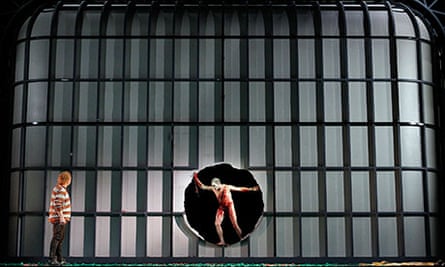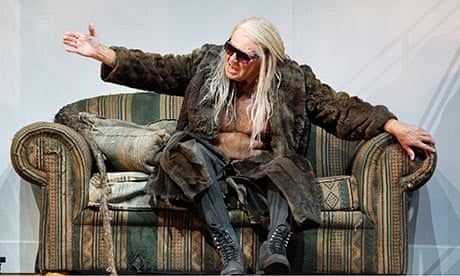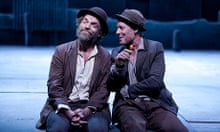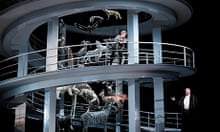Three quarters of the way through the Melbourne Ring, and the rationale of Neil Armfield's production gets no clearer. Through most of Siegfried, in fact, there seem to be at least three different approaches intertwined; all of them introduced at various points in Das Rheingold and Die Walküre, but with no suggestion that they might fuse into a dramatic unity.
There is the reductive naturalism of the first act, which translates the action into contemporary stereotypes and commonplaces without any sense of a mythic dimension – Stefan Vinke's Struwelpeter-haired, rugby-shirted Siegfried in a scruffy teenager's bedroom, while Mime (Graeme Macfarlane) heats up meals in a microwave, and attempts to forge swords on the kitchen table. The following acts then hark back to Rheingold's post-modern flirtations with music hall.
Not dancing girls this time but video close-ups of Jud Arthur's Fafner making up his face as a clown for his encounter with Siegfried, only to emerge from his lair naked and bloodied after his fatal wounding, and a false proscenium complete with gold lamé curtain through which Siegfried must pass to discover the sleeping Brünnhilde. She is now confined to one of the display cases in which Wotan kept his animals in Rheingold, with her horse Grane as a stuffed model close by, though the allegorical significance of those allusions still escapes me.

If it was all more vividly theatrical, then the disjunctions and the puzzles might not matter. But what seemed fresh in Rheingold, now seems just laboured, and nothing in the conducting or the individual performances, despite the energy of some of them, provides enough of that missing ingredient.
Vinke is a robust Heldentenor, tireless if not very subtle, who more than holds his own with Susan Bullock's rather tremulous Brünnhilde and goes at the forging scene with great purpose, only to have it undermined by Pietari Inkinen's persistently slow tempi; the conductor is still apparently more concerned with clarity than with sustaining dramatic momentum. But Terje Stensvold seems more convincing, more vocally assertive as the Wanderer than he was as Wotan, despite being got up like a superannuated member of a heavy metal band with long grey hair, bare chest and shades. His confrontations, first with Warwick Fyfe's still raging Alberich, then with Deborah Humble's wheelchair-bound Erda, have an intensity that only emphasises the lack of anything like it elsewhere.





Comments (…)
Sign in or create your Guardian account to join the discussion